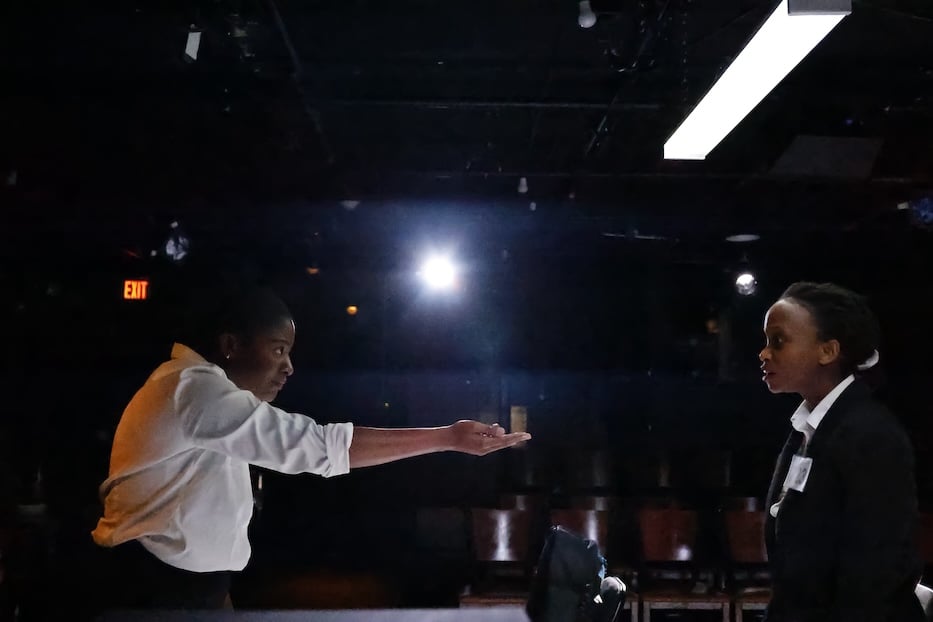
Rethabile Headbush as Noluthando Princess Vavi / #587, Thando Mangcu as Dimakatso Leraba / #723. Richard Lee Photo.
Darkness came over the stage of the black box theater, the only glimmer of light from the silver jewelry worn by two actors. Sounds built on each other: the click of a pen, the tap of a shoe, the whack of a rolled-up paper against someone’s leg. Audience members sat on the edge of their seats as they waited for the show to begin.
This was the scene at the Yale Summer Cabaret last Thursday, as an opening night crowd watched the premiere of Rethabile Headbush and Thando Mangcu’s The Interview, the second show in the Cab’s experimental summer season. Titled “Petri Dish,” the season presents exclusively new work at the Cab’s 217 Park St. home.
The Yale Cabaret was established by students of the David Geffen School of Drama at Yale in 1968, and continues to flourish with each project and production.
Set entirely in a corporate waiting room, The Interview follows two job candidates (Headbush and Mangcu) at a telecommunications company, on the cusp of an interview process that becomes increasingly more absurd. Inspiration for this show came from Headbush’s own experience in her native South Africa in the midst of the Covid-19 pandemic, looking for a non-theater related job while in drama school there.
South Africa has a large youth unemployment problem, and as the show goes on we watch the candidates, Noluthando and Dimakatso, relay their struggles in the search for a job. Headbush’s writing tackles the unemployment crisis with a poised and clear voice.
“You almost feel like you are a number,” Headbush said in a joint interview with Mangcu, explaining why the administrator’s voice (an overhead speaker role played by Henita Telo) refers to the two job candidates by numbers and not their names. “You have to prepare for things you don't even expect ... Even how your demeanor is with the person at the front desk could affect your possibility of getting a job.”
Thursday, the lights came up on the waiting room of Forest Inc., a fictionalized telecommunications company. Sitting in two of the eight identical chairs were the characters, Noluthando Princess Vavi / #587 (Headbush, who is studying stage management) and Dimakatso Leraba /#723 (Mangcu, who is doing graduate work in dramaturgy).
In this world, the two had been friends since grade school, but stopped talking when Noluthando was forced to drop out of college for financial reasons, and Dimakatso continued on to become more accomplished. She had gained an air of superiority over her friend, who took offense at Dimakatso's absence in her life.
As the two once again sat in the same position as each other, in this waiting room, it seemed there might be a chance for them to reconnect. Over the course of the 50-minute production, they did just that and more: we in the audience watched them argue, reminisce, and laugh, as they both continued to chase the never ending loop of job applications.
“The thing that was discussed a lot was the big unemployment crisis as a universal topic. And the vulnerability that comes with being desperate for a job, especially as a young person who has qualifications but cannot get the experience,” Mangcu said of the hypocritical nature of the job application process, specifically toward young people.
This show grapples not only with the unemployment crisis, but with the phenomenon of “Black women being pitted against each other,” as Headbush described it. As Forest Inc. dangled the tempting possibility of a job in front of both characters, both also had to face how much they were willing to give up for each other, and at what cost they would still chase this job.
An audience member could see this in Dimakatso’s “Beacon Black Girl Monologue" as she expressed frustration that despite her success in school, she was “no more than a beacon Black girl for how things should be done, cosplaying as a success story for all the Black girls behind me.”
In the end, Noluthando and Dimakatso discovered that there was no one at the administrator’s desk at all, that they were alone. They felt conned, bonding over their struggle that day.
But just as they began to fool around, having fun together at the expense of the wild system that has kept them there all day, Noluthando’s number was called from the speaker.
She had finally been granted an interview. And despite her cynicism, she walked toward the interview room, still chasing this “opportunity,” as the lights faded on Dimakatso and the show came to an end.
As the show ended and the lights dimmed, Forest Inc.’s “We’re hiring!” jingle played, the same one we had heard several times throughout the show. This time, though, it was different. Instead of “great opportunities!” the announcer’s voice proclaimed “great opportunities … to be deceived.”
This article comes from the 2025 cohort of the Youth Arts Journalism Initiative (YAJI). YAJI is a program in which New Haven, Hamden and West Haven Public Schools high school students pitch, write, edit and publish articles through the Arts Paper. This year, YAJI advisors include Arts Paper Editor Lucy Gellman and reporter and YAJI alum Abiba Biao. Olivia Tapia Ko is a rising sophomore at New Haven Academy.